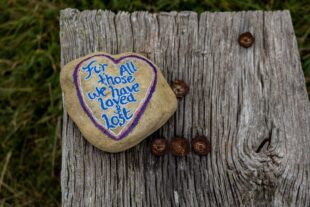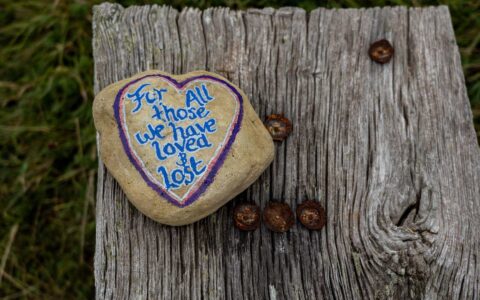Understanding Disenfranchised Grief
Karyn George
Grief is the emotional and psychological response people have after suffering significant loss. Different societies have norms, rituals, and attitudes toward grief that are considered normal. When grief does not align itself with these norms and attitudes it is termed disenfranchised grief.
 The term was coined by Dr. Kenneth Doka, a respected authority on understanding grief and bereavement. According to him, disenfranchised grief is grief that is not openly acknowledged, socially validated, or publicly mourned.
The term was coined by Dr. Kenneth Doka, a respected authority on understanding grief and bereavement. According to him, disenfranchised grief is grief that is not openly acknowledged, socially validated, or publicly mourned.
Though a person’s grief is normal, real, and legitimate, society denies the grieving person space and support to grieve. For grief to be felt fully and dealt with properly, it must be acknowledged. For any healing to occur, people’s losses must be understood and honored. The lack of validation of people’s grief is what causes it to develop into disenfranchised grief.
Those who experience disenfranchised grief usually feel a sense of isolation and judgment which can make the grieving process more challenging. They can sometimes experience direct or indirect criticism for either grieving or how they are grieving.
Societies and groups of people have come up with what they deem to be culturally and religiously appropriate when it comes to grief. This can be in the expression of it or what is deemed worthy to be grieved. Anyone who is experiencing or expressing grief outside of these agreed-upon standards does not get the support and understanding they desperately need.
Key elements of disenfranchised grief.
According to Corr 1999, three elements contribute to someone’s grief being disenfranchised:
 The relationship is not recognized.
The relationship is not recognized.
In this instance, the relationship one has with the person they have lost is not recognized or considered taboo. It could also be a case that society feels the person grieving is too far removed from the loss that they should not be experiencing any grief at all.
A typical situation where a relationship is not recognized is the death of an affair partner or the break-up of an affair relationship. Though this relationship is frowned upon, it does not mean that the person who has lost will not experience grief. Society will not be empathetic to the grieving person hence they do not get the much-needed support.
Another way society disenfranchises people’s grief is when they are grieving someone they may be far removed from relationally. This could be a distant relative, teacher, celebrity, or social media influencer.
Somehow society believes that grief is only reserved for those it deems close to us in relation, it does not consider the significant emotional bond people develop with those they deem important or inspirational. Unfortunately, this is not the case. Grief is determined by the bond one feels to the person, regardless of how society views their relationship.
The loss is not recognized.
When a loss is not recognized by society it is deemed inappropriate to grieve that loss. This unfortunately forces those who are experiencing that loss to grieve in isolation and private. Losses are not recognized by society for a variety of reasons. Death-related losses like suicide, drug overdose, or a loved one on death row carry a lot of stigma making those who are grieving their loved ones to be shunned and unsupported.
Grief has been described as the reaction to loss, not just death. However, losses that are not death-related do not get recognized as real losses hence those who are grieving these losses are not validated in their pain. Grief can be a result of a breakup, losing one’s job, losing a pet, or grieving something a person never had but yearned for, like having a baby.
The griever is not recognized.
 When a griever is not recognized it means that in the aftermath of loss, they are not expected to be grieving hence their grief is overlooked. This is usually the case when a couple loses a child either to a miscarriage or stillbirth.
When a griever is not recognized it means that in the aftermath of loss, they are not expected to be grieving hence their grief is overlooked. This is usually the case when a couple loses a child either to a miscarriage or stillbirth.
The focus is usually on the mother of the child and the father’s grief is often overlooked and not expected hence his experience is not validated. Children’s grief is often invalidated because society has the belief that children due to their age and assumed lack of understanding of loss might be thought to be incapable of grieving.
Other considerations.
Expression of grief.
Another element that contributes to one’s experience of grief being disenfranchised is their expression of it. Usually, when someone experiences a significant loss, the expectation is that they will be sad, and melancholy, they might cry or withdraw from social activities.
However, people grieve differently, and some do the opposite of what society expects and are then criticized for that behavior. A person can be criticized for going to work earlier than people expected, they might feel the person is not grieving at all if they can work.
At funerals, those who cry excessively or not at all are put in the same category depending on societal expectations. If their actions are not consistent with what is expected of them during the funeral and the days following, they will not be supported or handled empathetically.
Situations where grief can be disenfranchised.
- The death of a loved one through stigmatized situations like suicide, drug overdose, death penalty, domestic violence, or a stigmatized illness like HIV/AIDS.
- Loss of a pet, whether due to death or running away.
- Losing someone who is not a close family member or friend like a celebrity, co-worker, teacher, or patient (for those in health care).
- Losing an ex-partner, whether that be an ex-husband or wife, or an ex-boyfriend or girlfriend.
- Losing one’s mobility or cognitive functioning due to an accident or illness.
- Losing an affair partner, either due to termination of the relationship or their passing.
- Losing one’s freedom, sense of security, or human rights due to war and/or terrorism.
- For those trying to have children via IVF or adoption, losing their children either due to the adoption procedure not going through or failing to become pregnant after implant.
- Losing loved ones when you are young and people believing you are too young to grieve.
- Losing a child due to abortion, miscarriage, stillbirth, adoption, or being taken by the state because you are deemed an unfit parent.
- Losing one’s job or source of income.
Though this is not a full list of all that might cause people’s grief to be disenfranchised, it is important to take note for the sake of our loved ones. Our ability to validate and empathize with them during this difficult time goes a long way in helping them deal with their grief.
How to cope with disenfranchised grief.
Validate your grief.
The first step to dealing with grief is acknowledging that you are experiencing it in the first place. Even though society might not validate a person’s experience, they must permit themselves to grieve, without judgment. Knowing that it is a normal response to loss, those grieving in this way can start the journey to healing from a place of understanding.
Support groups.
One way a person’s grief can be validated and supported is by looking for support groups of people who have suffered similar losses. In this way, they will know they are not alone and will benefit from the experiences of others. Support groups offer empathy, understanding, and a safe space to share without fear of criticism.
Therapy.
Therapy can be a huge help to those who feel they are coping with disenfranchised grief. Therapists and Grief Counselors are there to provide a safe and non-judgmental space for people to process their grief, no matter their loss. Therapy also provides education and strategies one can use to navigate the grief they are experiencing.
 Self-help strategies.
Self-help strategies.
Helping oneself through grief they cannot express to others requires people to take responsibility for their healing. This can mean educating oneself about the type of grief and loss they are experiencing to validate their own experience and permit themselves to grieve fully. Other self-help strategies can include performing rituals that honor the loss. If it’s a loved one who passed away, this can mean celebrating their birthday, planting a tree, or creating art in their honor.
Reach out for help.
If you are experiencing disenfranchised grief and looking for support, please reach out to our offices. We will connect you to Therapists and Grief Counselors who will help you navigate this season in your life and help you deal with your grief. You do not have to walk alone; we are here to support you.
References:Corr, C. (1999). Enhancing the concept of disenfranchised grief
Photos:
“Candles on the Water”, Courtesy of Mike Labrum, Unsplash.com, CC0 License; “For All Those…”, Courtesy of Nick Fewings, Unsplash.com, CC0 License; “Watching the Water”, Courtesy of Pierre Bamin, Unsplash.com, CC0 License; “Raining again…”, Courtesy of Kristina Tripkovic, Unsplash.com, CC0 License







